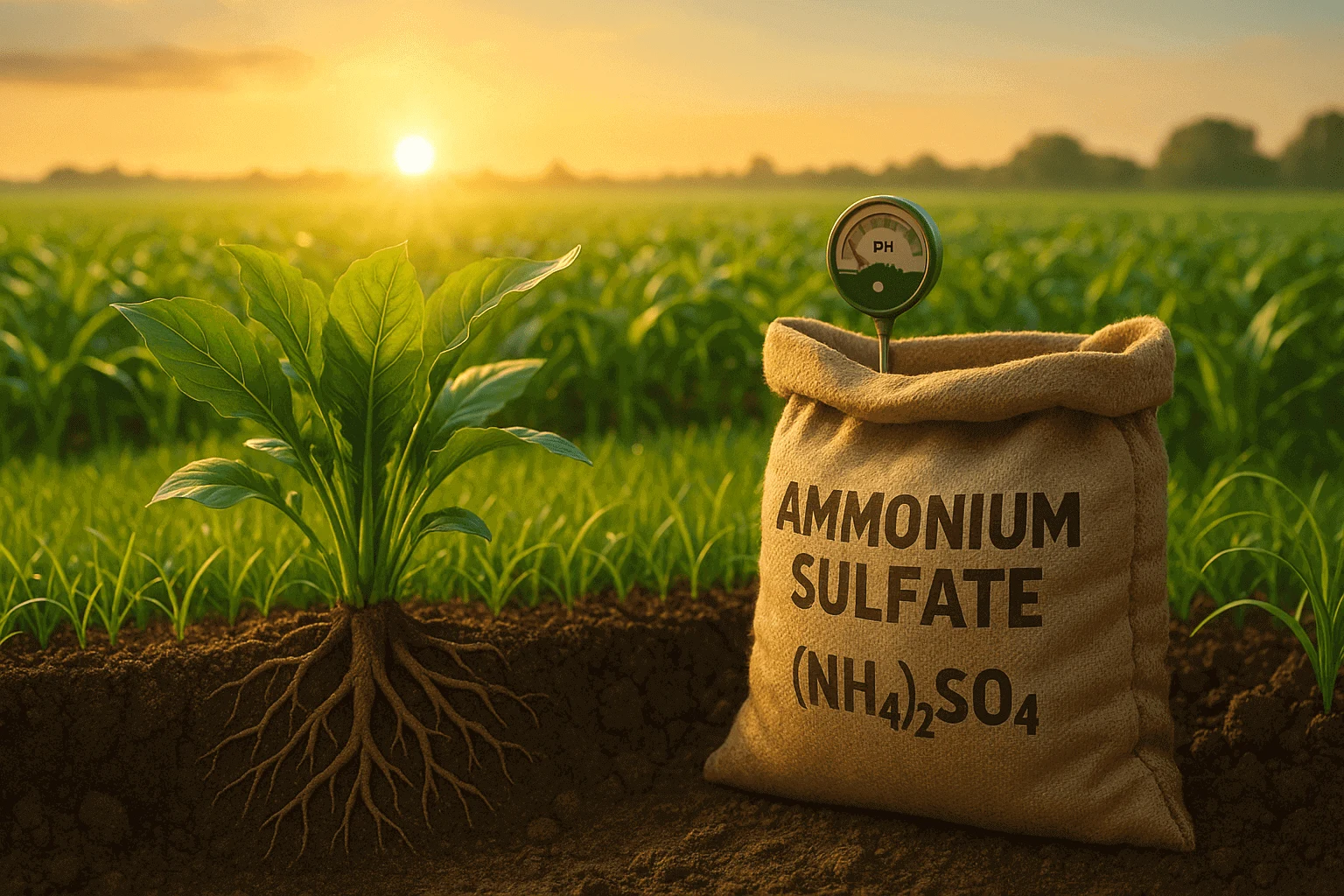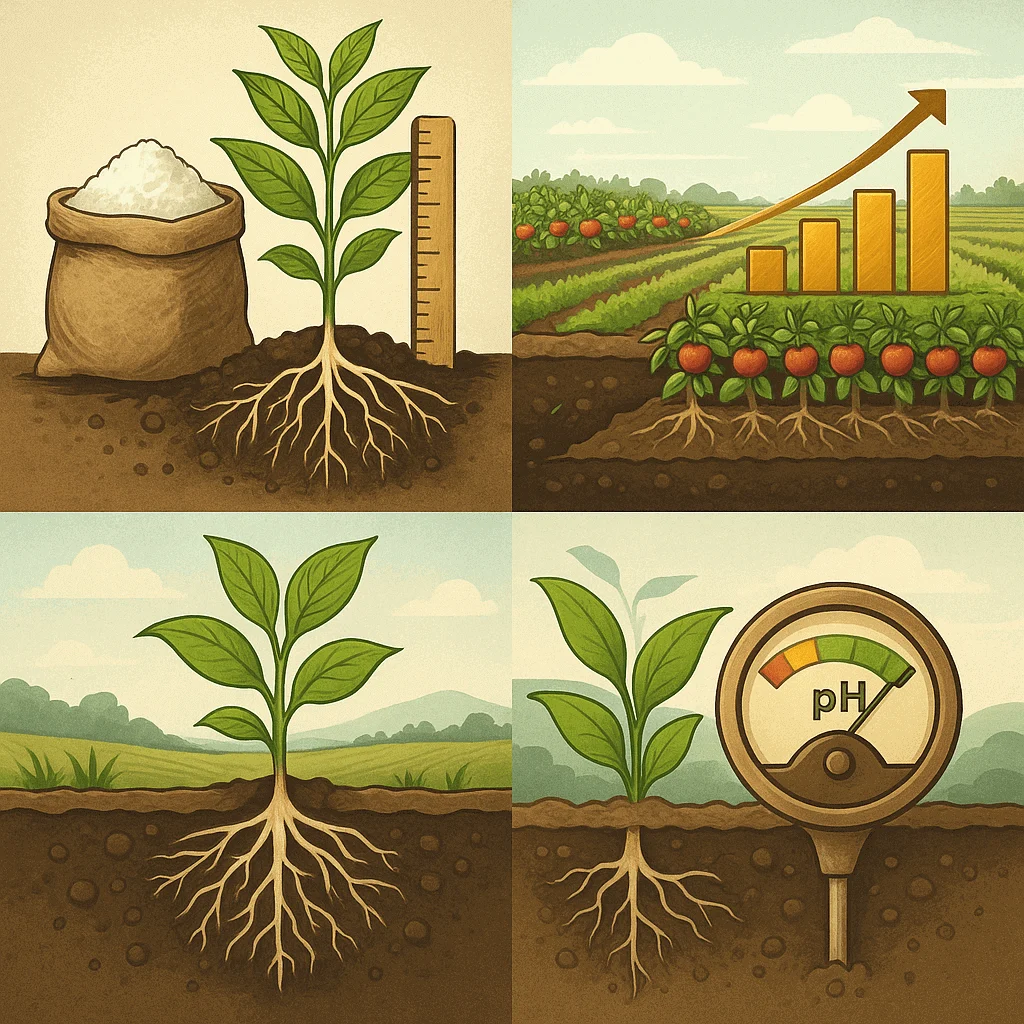Why should we use Ammonium Sulfate Fertilizer
The Hidden Secret Behind Explosive Plant Growth
Imagine a garden where plants grow with exceptional vitality, their roots deep and strong, and their leaves glowing with a vibrant green. This is every farmer’s or gardener’s dream. But the truth is that achieving such results requires more than just water and sunlight. Ammonium sulfate fertilizer, as one of the key tools in modern agriculture, plays an irreplaceable role in this transformation.
But why should we use this fertilizer? In this article, we will dive deep into its benefits and show how it can help you achieve higher yields, improve your soil, and save your plants from yellowing. Let’s uncover this secret step by step.
Why Ammonium Sulfate? The Amazing Benefits for Agriculture
Ammonium sulfate fertilizer is more than just a chemical compound; it is a solution that can transform your land into a highly productive ecosystem. Let’s take a closer look at the reasons for using it:
1. Accelerating Micronutrient Uptake: The Key to Plant Health
Just like humans, plants need a balanced diet. Micronutrients such as iron, zinc, and manganese are essential for healthy growth, but sometimes soil cannot provide them efficiently. Ammonium sulfate lowers soil pH and releases these nutrients, making them more available for plants.
This means your plants can absorb nutrients faster and continue growing more vigorously—especially in alkaline soils, where nutrient uptake is often a challenge.
2. Boosting Plant Growth: Up to 55% Improvement
One of the most remarkable advantages of ammonium sulfate is its ability to increase plant growth by 30–55%. Thanks to its nitrogen and sulfur content—both critical for photosynthesis and protein production—plants develop faster and healthier.
With a regular fertilization program, you can expect stronger, more vigorous plants in just a few months. This not only increases quantity but also improves the quality of your crops.
3. Higher Yields: 25–45% More Harvest
Every farmer dreams of higher yields, and ammonium sulfate makes this possible. By supplying nitrogen in an ammoniacal form that plants easily absorb, this fertilizer can increase yields by 25–45%.
This boost is especially significant for crops like wheat, tomatoes, and pistachios. And it’s not just about numbers—it’s about greater income, sustainability, and success in farming.
4. Stronger Root Development: A Firm Foundation for Plants
Roots are the backbone of any plant. Ammonium sulfate provides nitrogen and sulfur that promote strong, deep, and resilient root systems. Strong roots enable better water and nutrient absorption—particularly valuable in drought-prone regions.
5. Greener Leaves: 28–35% Increase in Chlorophyll
Nothing is as attractive as lush, green leaves. Ammonium sulfate enhances leaf greenness by 28–35%. This not only beautifies your fields and gardens but also reflects healthier, more vigorous plants. For greenhouse growers, this is a competitive advantage in attracting buyers.
6. Soil pH Adjustment: Achieving the Ideal Balance
Alkaline soils can be a nightmare for farmers, as they hinder nutrient absorption. Ammonium sulfate lowers soil pH to the optimal range for plant growth. This adjustment improves nutrient uptake and prevents long-term soil problems—especially useful in regions with naturally alkaline soils, such as much of Iran.
7. Revitalizing Yellowing Plants: Bringing Life Back
Yellowing leaves are often a sign of nitrogen deficiency or poor soil conditions. Ammonium sulfate provides the nitrogen needed to rejuvenate plants, restoring their natural green vitality.
8. Reducing Weed Growth: A Smarter Way to Farm
Weeds compete for water and nutrients. Ammonium sulfate, with its mild herbicidal effect, helps reduce weed growth—allowing your main crops to thrive without additional chemical herbicides.
Practical Guidelines: How to Use Ammonium Sulfate Effectively
Timing: The Best Season for Application
Late winter or early spring, when plants awaken from dormancy, is the best time to apply ammonium sulfate. For pistachios and citrus, this coincides with vegetative growth. During the growing season, apply smaller, regular doses for sustained effectiveness.
Application Methods: From Deep Placement to Foliar Spray
Deep placement (Chalkood): Ideal for fruit trees like pistachios and walnuts. Apply fertilizer around the root zone and irrigate.
Broadcasting: Suitable for wheat and corn. Spread evenly on soil surface, followed by irrigation.
Foliar spraying: Effective for wheat protein improvement or boosting tomato growth.
General guideline: 200–400 kg/ha for field crops and 1 kg per tree in spring. Always adjust based on soil tests.
Safety Guidelines
Always use gloves and masks to avoid contact or inhalation.
Overuse can cause excessive soil acidity—always begin with a soil analysis.
Comparison Table: Ammonium Sulfate vs. Other Fertilizers
| Criteria | Ammonium Sulfate | Urea | Ammonium Nitrate |
|---|---|---|---|
| Nitrogen Content | 21% | 46% | 34% |
| Sulfur Content | 24% | 0% | 0% |
| Effect on Soil pH | Acidifying | Neutral | Alkalizing |
| Absorption Rate | Fast (Ammoniacal) | Slow (Nitrate-based) | Fast (Nitrate-based) |
| Weed Control Effect | Yes | No | No |
This comparison shows why ammonium sulfate is particularly valuable in alkaline soils.
Final Thoughts: What’s Your Next Step?
Ammonium sulfate is more than a fertilizer—it’s a reliable partner for farmers and gardeners aiming to improve yield and quality. From growth acceleration to soil pH balance, it offers tools to transform your farm.
But success depends on smart use. Start with soil testing, design a customized fertilization plan, and select high-quality ammonium sulfate.
Are you ready to upgrade your farming results with ammonium sulfate? Share your experiences and insights—you might uncover new secrets for better farming!
FAQs: Everything You Need to Know About Ammonium Sulfate
1. What is ammonium sulfate and how does it work?
It is a compound of nitrogen and sulfur. By releasing ammonium ions into the soil, it lowers pH and makes nutrients more available to plants.
2. Can overuse of ammonium sulfate be harmful?
Yes. Overuse can cause excessive soil acidity or salinity. Always determine dosage through soil testing.
3. Which crops benefit most from ammonium sulfate?
It is highly effective for tomatoes, wheat, pistachios, canola, and many other crops—particularly in alkaline soils.
.


